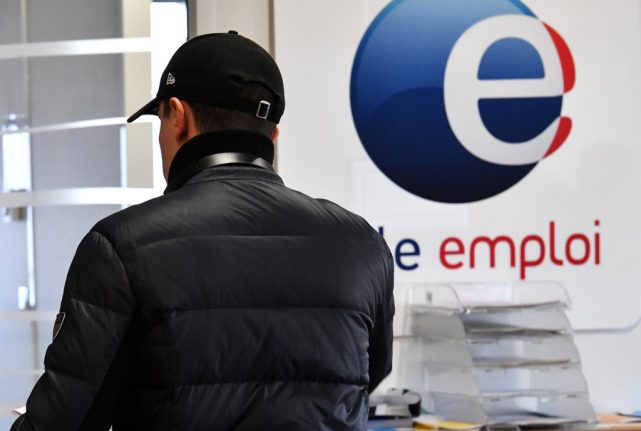What's happening with unemployment in France?
It's falling fairly steadily. Last year saw a steady year-long fall to reach its lowest level in a decade and figures released on Thursday for the final quarter of 2019 continued that trend.
READ ALSO Why 2020 is set to be a good year for job-hunters in France

Graphic: INSEE
Overall unemployment in France now stands at 8.1 percent – down from 8.7 percent in the first quarter of the year and France's lowest rate since 2009.
The figures includes France's overseas départements which historically have very high levels of unemployment – in mainland France the jobless rate is now 7.9 percent.
French president Emmanuel Macron has set a target to reach 7 percent by the end of 2022, which now looks possible. Or “downright attainable” in the more bullish words of the country's employment minister Muriel Pénicaud.
So everything is good?
Some things are good, for sure.
The French economy is still growing, albeit more slowly, and the fall in jobless figures seems to be an ongoing trend repeated over several quarters.
More new businesses are being created, 210,000 new jobs were created in 2019 and France is still doing well on the index of attractiveness to foreign investors.
French business leaders say their order books are full and they are looking to recruit in 2020, with several big firms going ahead with major expansions.
The digital and technology sectors are expected to recruit heavily in 2020, as well as the engineering sector, service roles and leisure and tourism.
In fact many business leaders say their major problem is finding recruits with the skills that they need – which is certainly good news for anyone job-hunting in 2020.

Station F in Paris is a workspace for startups. Photo: AFP
No problems, then?
Not quite. France's unemployment figures may be going in the right direction, but the country still has one of the highest jobless rates in the EU with 2.42 million people out work.
France's 8.1 percent rate for the final quarter of 2019 contrasts with Germany at 3.2 percent, the UK at 4 percent and the EU average at 6.4 percent.
Only Spain (14.1 percent) and Italy (10.6 percent) have higher unemployment rates than France.
France has historically been one of the worst performers in Europe in employment and one of Macron's major objectives is to halt this trend and make the country more 'business friendly' – to which ends he has introduced a series of reforms of the country's famously tight labour laws.
The other problem is that the job creation is not being felt evenly.
Youth unemployment is still very high at 20 percent and has even grown slightly and much of the job creation is centered on France's big cities – particularly Paris – leaving the 'left behind' areas of small town and rural France still struggling.
So what's the government doing about it?
Well apart from the reforms to the labour laws mentioned above, the unemployment benefits system in France has also undergone some structural changes (leading some to suggest that the fall in unemployment is in part due to different methods of counting).
The new system is slightly tougher to access – for example you have to have been working for six months before you can claim benefits – and has more of an emphasis on training and job hunting.
READ ALSO The new rules for unemployment benefits in France
There's also a benefit on offer for people setting up their own businesses – part of Macron's efforts to rebrand France as 'the startup nation'.
Not everyone appreciates the changes and seasonal workers in French ski resorts are staging strike action on Saturday over cuts in the benefits that they can access.
But it does seem that, despite 'yellow vest' protests and mass strike action over the past year, France's economy is at least moving in the right direction.
READ ALSO
- What jobs are on offer in Paris and the surrounding area?
- What are the jobs in south west France?
- What jobs are on offer in Lyon and the Auvergne-Rhône-Alpes region?



 Please whitelist us to continue reading.
Please whitelist us to continue reading.
Member comments